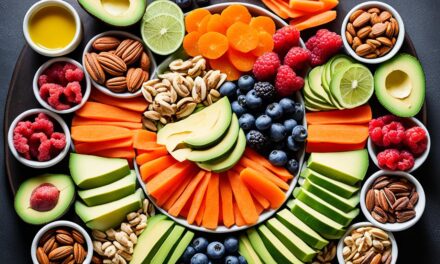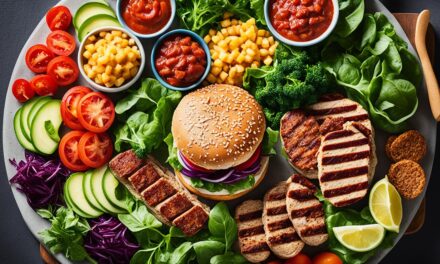Are you tired of bouncing from one diet to another, desperately searching for the secret to weight loss and optimal health? If so, you’ve probably come across the popular trend of clean eating. The idea of nourishing your body with unprocessed, whole foods and eliminating harmful ingredients sounds enticing, promising a pathway to a healthier lifestyle. But is it really the miracle solution we’ve been searching for, or is it just another diet trap waiting to ensnare us?
Let me tell you a story that perfectly illustrates the potential pitfalls of clean eating. Meet Emily, a determined woman on a mission to improve her health. She dove headfirst into the world of clean eating, meticulously researching the best foods to consume and the ones to avoid like the plague.
Emily set strict guidelines for herself, banishing anything processed, refined, or containing even a hint of added sugar. She meticulously planned her meals, spending hours in the kitchen preparing chia seed puddings, kale salads, and homemade granola bars. She stocked her pantry with organic, non-GMO products and prided herself on her commitment to clean eating.
But as time went on, Emily began to realize that her obsession with clean eating was taking a toll on her mental and physical well-being. She felt guilty if she deviated even slightly from her self-imposed rules, and socializing became a challenge as she struggled to find “clean” options at restaurants or parties.
Emily’s relationship with food had become a never-ending cycle of restriction, guilt, and anxiety. What started as a quest for health and wellness had turned into a diet trap, trapping her in a rigid and unsustainable way of eating.
So, what can we learn from Emily’s story? The truth is, clean eating can be a valuable tool for improving nutrition and overall health. However, it’s essential to avoid these common mistakes that can turn it into a diet trap:
Key Takeaways:
- Obsessing over clean eating can lead to an unhealthy relationship with food.
- Strictly following a clean eating diet can be unsustainable in the long term.
- Balance is key – prioritize healthy eating, but also allow yourself to enjoy life’s pleasures.
- Remember that nutrition is only one piece of the puzzle – factors such as activity level, mental health, and genetics also play a role in overall well-being.
- Don’t let clean eating become an all-or-nothing mindset; find a sustainable approach that works for you.
The Problem with Clean Eating
Are you a clean eating enthusiast? While clean eating may seem like the perfect solution to achieve your health and fitness goals, it can actually be a double-edged sword. Clean eating is often seen as a strict and rigid way of eating that solely focuses on food choices. However, many people make the mistake of jumping into clean eating and restrictive diets without considering other crucial factors that contribute to overall well-being.
In our pursuit of clean eating, we often become obsessed with the strict guidelines of what we can and cannot eat. This narrow focus on food can lead to an obsession with clean eating and unsustainable habits. While it’s important to prioritize healthy food choices, there is much more to health and fitness than just what we eat.
Let’s take a closer look at the common mistakes people make when embarking on a clean eating journey:
- Strict Diets: Many people dive into strict clean eating diets without considering their individual needs and preferences. These diets often eliminate entire food groups, leading to nutritional imbalances and restricted enjoyment of food.
- Lack of Flexibility: Clean eating can become rigid, leaving no room for flexibility or occasional indulgences. This can create an unhealthy relationship with food and lead to feelings of guilt and deprivation.
- Neglecting Other Factors: Health and fitness are influenced by various factors such as physical activity, mental health, relationships, and genetics. Focusing solely on clean eating neglects the importance of these factors in achieving overall well-being.
- Overemphasis on Food Choices: While clean eating emphasizes choosing nutrient-dense foods, it’s important to remember that the quantity of calories consumed also matters. Merely focusing on clean food choices without considering calorie balance can hinder fat loss goals.
“Clean eating can become an all-consuming obsession that excludes other important aspects of health and wellness.”
It’s essential to strike a balance between clean eating and enjoying life. Remember that strict diets may not be sustainable in the long run and can lead to a negative relationship with food. The key is to focus on nourishing your body with a variety of wholesome foods while also allowing yourself the freedom to indulge occasionally.
Next, let’s explore some common mistakes that people make when attempting clean eating, specifically related to food choices and calorie counting.
Common Mistakes in Clean Eating
You’ve made the decision to embrace clean eating and improve your health. That’s fantastic! However, it’s important to be aware of the common mistakes people often make when following a clean eating plan. Don’t worry, though – we’re here to help you navigate the pitfalls and set you up for success.
Prioritizing Food Choices Over Calorie Balance
One of the biggest mistakes people make in clean eating is focusing solely on food choices without considering the overall balance of calories. Yes, choosing nutrient-dense foods is important, but it’s still essential to be mindful of the quantity of calories you consume. Just because you’re eating clean doesn’t mean you can eat unlimited amounts of avocado toast or almond butter!
Remember, weight management is all about energy balance – the number of calories you consume versus the number of calories you burn. So, while opting for clean, healthy foods is a great choice, be mindful of portion sizes and total calorie intake to achieve your health and fitness goals.
Relying Too Heavily on Counting Calories
On the other end of the spectrum, some individuals become overly reliant on counting calories in their quest for clean eating. While tracking calories can be a useful tool for understanding your intake, it’s important not to become obsessed or restricted by the numbers.
Healthy eating should be flexible and enjoyable, rather than driven by rigid calorie calculations. Besides, not all calories are created equal – the quality of the calories matters too. Nutrient-dense, whole foods provide more nourishment and satiety than processed or sugary foods, even if they contain the same number of calories. So, instead of fixating solely on calorie counting, focus on making balanced food choices that incorporate a variety of nutrients.
“The key to clean eating is striking a balance between nourishing your body and enjoying the food you eat.”
By finding a middle ground between mindful eating and embracing your favorite indulgences, you’ll create sustainable habits for long-term success. After all, life is meant to be lived, not spent obsessing over every calorie!
Avoiding Entire Food Groups
Another mistake that often creeps into clean eating is the tendency to restrict or avoid entire food groups. While it’s important to prioritize nutrient-dense options, cutting out entire food groups can lead to nutrient deficiencies and an imbalanced diet.
Remember, each food group offers unique nutrients that contribute to overall health and well-being. For example, whole grains provide fiber and energy, dairy products contribute calcium and vitamin D, and lean meats offer essential proteins. So, instead of eliminating entire food groups, focus on the quality of the foods within them and consider portion sizes.
Now, let’s summarize the common mistakes in clean eating in a handy table:
| Mistake | Impact |
|---|---|
| Prioritizing food choices over calorie balance | Difficulties in managing weight and achieving fitness goals |
| Relying too heavily on counting calories | Unhealthy relationship with food and potential for restrictive habits |
| Avoiding entire food groups | Potential nutrient deficiencies and imbalanced diet |
Remember, clean eating is about finding balance and nourishing your body with wholesome foods while still enjoying the pleasures of life. Avoid these common mistakes, and you’ll be well on your way to a healthier and happier you!
The Impact of Clean Eating on Mental Health
Clean eating is often promoted as a way to improve our physical health and overall well-being. However, it’s important to recognize that this dietary approach can have unintended consequences on our mental health. The obsession with clean eating and the strict adherence to dietary rules can lead to the development of orthorexia, a pathological fixation on healthy eating.
Orthorexia is not yet recognized as a clinical diagnosis, but it shares similarities with other eating disorders. Individuals with orthorexia become consumed by the quality and purity of their food choices, often excluding entire food groups or becoming overly restrictive in their diets. The pursuit of “clean” and “pure” eating becomes an obsession, causing significant distress and impairing their ability to enjoy a balanced and varied diet.
The constant preoccupation with food and the fear of consuming anything considered unhealthy can take a toll on mental health. Feelings of guilt, anxiety, and social isolation may arise as individuals with orthorexia prioritize their diet over other important aspects of life. The rigid rules and restrictions associated with clean eating can create a sense of self-control that gives individuals a false sense of empowerment, which can further fuel their obsession.
The Importance of Balance
While it’s important to prioritize healthy eating and nourishing our bodies, it is equally crucial to find a balance that includes enjoyment and flexibility. It’s essential to remember that mental health is just as important as physical health when striving for overall well-being.
“The key to a healthy life lies in finding the sweet spot between obsessing over what we eat and nurturing a positive relationship with food,” says Dr. Amanda Johnson, a renowned mental health expert.
“Clean eating should never be at the expense of our mental well-being. It’s about finding a middle ground where we can make mindful food choices without feeling overwhelmed or restricted.”
Seeking professional help is crucial for individuals who suspect they may have orthorexia or are experiencing negative effects on their mental health as a result of their approach to clean eating. A qualified healthcare professional can provide guidance, support, and help develop a balanced approach to both nutrition and mental well-being.
Conclusion
So, you’ve learned about the potential pitfalls of clean eating and how it can become a diet trap if you’re not careful. It’s time to take a step back and reevaluate your approach.
Rather than obsessing over every single food choice and meticulously counting calories, focus on finding a sustainable balance. Remember, clean eating is about nourishing your body with wholesome foods, but it should never take away from the enjoyment of life.
Take care of not only your physical health but also your mental well-being. The pressure to adhere to strict dietary rules can be overwhelming, leading to negative emotions and an unhealthy relationship with food. Take time to prioritize self-care, relaxation, and indulging in foods that bring you joy.
Keep in mind that health and wellness go far beyond what you eat. It’s a holistic approach that encompasses various factors like activity level, mental health, relationships, and genetics. By finding a balance and giving yourself the flexibility to enjoy life, you’ll be on your way to achieving long-term health and wellness goals without falling into the clean eating diet trap.
FAQ
Why does clean eating often fail or not lead to weight loss?
What is the problem with clean eating?
What are some common mistakes in clean eating?
How does clean eating impact mental health?
What is the conclusion of clean eating as a diet trap?
MORE SOURCES TO READ:
- https://www.legendarylifepodcast.com/ted-talk-200-why-clean-eating-isnt-the-magic-fat-loss-bullet-you-think-and-what-to-do-instead/
- https://www.buzzfeed.com/ayeshamittal/kombucha-cha
- https://www.everand.com/podcast/418009937/50-Breaking-Free-from-Clean-Eating-Fitness-Obsession-w-Alicia-Melgoza-Orthorexia-Recovery-Coach-Recovery-coach-Alicia-Melgoza-explains-how-she-d
![]()














Recent Comments